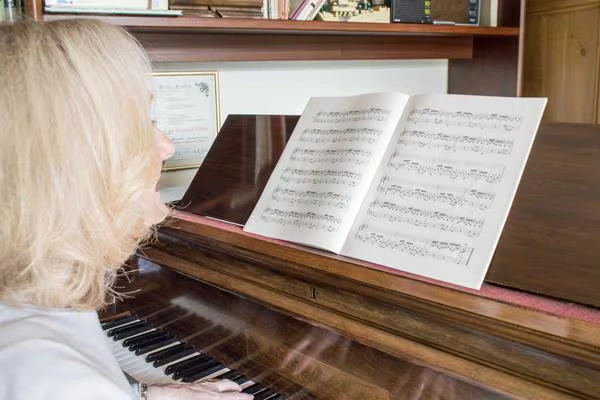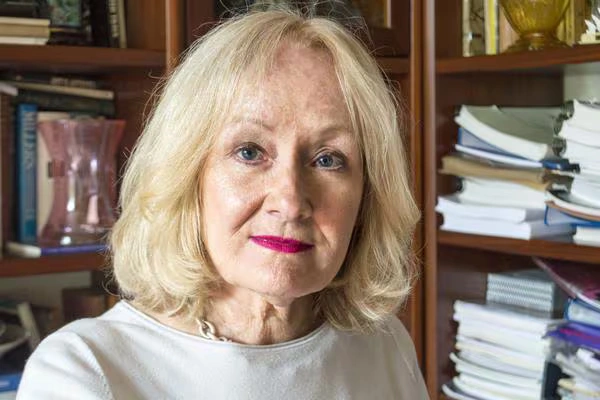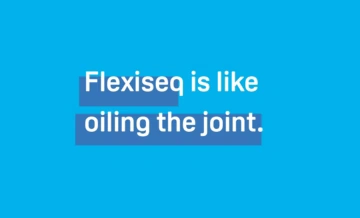Ursula Malewski is passionate about music. She teaches piano, she’s a jazz vocalist and she runs jazz courses in the hope of passing on her love of music to the next generation through her organisation MEhr Clef. But when she needed a knee operation earlier this year there was a concern that the music might stop, until she found a solution singing all the right tunes.
I first hurt my knee…
in a very gentle skiing fall in 2007. It didn’t hurt in the fall but I was wearing hire skis and boots and the ski didn’t pop out as it’s supposed to. The result was a double meniscal tear.
To begin with…
the hospital felt nothing needed to be done but to see how the injury developed. It got progressively worse. I used to love playing tennis which really didn’t help the injury, the knee would just swell up so I had to give up tennis completely. I was in too much pain and it was too swollen.
In 2011 I had…
my first arthroscopy (a surgical technique whereby an instrument is inserted into a joint to inspect, monitor and repair tissue damage) which didn’t work very well. I had a second arthroscopy in 2012 which was slightly better but I was still in a lot of pain. It was suggested then that I needed a knee replacement. However, I sought a second opinion in Germany with a consultant who likes to preserve knees. He felt it was too early for a knee replacement.
I was offered cortisone injections…
in the UK but once you start with them you need to continue on a regular basis. I wasn’t happy with that. Regular Cortisone can be a contributing factor to osteoporosis. I knew I had good bones from tests and didn’t want to jeopardize them.
My German consultant suggested…
something called PRP (Platelet Rich Plasma) where they take a sample of your blood and separate its constituents before injecting the platelets back into your knee. It is a course of four injections over four weeks. Although it’s an experimental treatment, the result of this for me was three years of peace. It was wonderful. I was almost back to normal again.

But ultimately the knee…
started deteriorating again. I needed a replacement. I could hear the scraping of bone on bone.
I had the knee replacement…
on the 26th February 2016. The consultant did say it was one of the worst knees he had seen in a very long time. But the implant went very well.
Five weeks later…
I started developing keloid scars and adhesions which left the knee very stiff. My movement became impaired, I couldn’t straighten the leg and as a result I was putting a lot of pressure on the other knee. It is normal after a knee replacement. The increased weight and pressure on the good knee started to really hurt. It was like the pain I had in the bad knee to begin with.
When that pain first started I thought…
if it continues I would end up with osteoarthritic problems in the good knee because I was putting so much pressure on it. My consultant told me that due to the keloid scarring it could take up to two years for my knee to be fully healed. Most people with knee replacement surgery are up and walking without issues in six months. So my good knee was now being put in jeopardy.
When both knees are sore…
it impairs my whole life. I can’t drive, I can’t walk, I can’t play piano comfortably because I can’t sit at the piano pain free. I can’t run my jazz courses, I can’t perform because I can’t stand on stage for a whole set.
You take your mobility…
for granted until it is taken away. You don’t realise how debilitating it is until something like this happens. The knee is one of the most important and complex joints in the body. Without it you can’t walk, so you’re in a wheelchair.
My son-in-law suggested…
I try Flexiseq. I’ve been using it every morning and every night as per instructions. The result: I no longer have a painful good knee. I did, for the sake of scientific experiment, stop using it to see if it really was the Flexiseq that was helping or my imagination. When I stopped it for a few days the pain returned. I very quickly went back to it and am very happy with the product. As long as I need it I’ll keep buying it.
I can’t take any form of…
anti-inflammatories as they upset my stomach very badly. I can just about handle slow release Ibuprofen but I’m really not keen on taking pharmaceuticals. It’s great that Flexiseq is not a pharmaceutical.
Flexiseq is like…
oiling the joint. At one point I was offered steroids for the knee but I refused that, the last thing I wanted was a painkiller. I think if I’d had Flexiseq from the beginning I may not have needed PRP and there is a good chance that Flexiseq could have slowed the deterioration and the need for knee replacement surgery as early as 2016.





